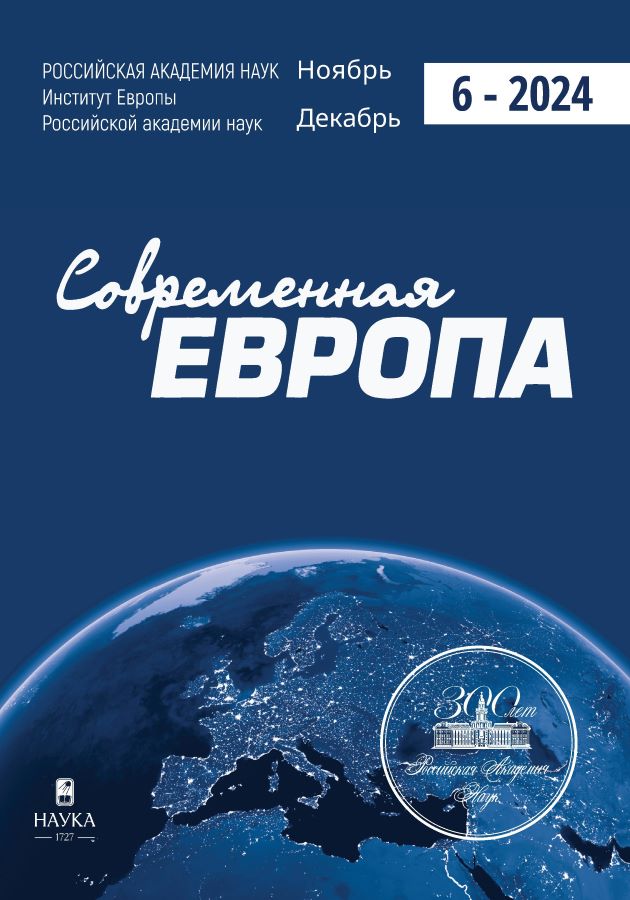Competitiveness of Germany's Economic and Political Space
- Autores: Belov V.B1
-
Afiliações:
- Institute of Europe RAS
- Edição: Nº 6 (127) (2024)
- Páginas: 79-88
- Seção: PROBLEMS OF ECONOMY
- URL: https://ter-arkhiv.ru/0201-7083/article/view/652298
- DOI: https://doi.org/10.31857/S020170832406007X
- ID: 652298
Citar
Texto integral
Resumo
Germany's economic Standort, as a crucial component of the European Union's broader economic and political space, largely shapes its competitiveness. In his September 2024 report on this topic, Mario Draghi gave special, though understandibly insufficient, attention to Germany's role. This article aims to provide a comprehensive analysis of the competitive strengths and weaknesses of Germany's economy. The author employs a spatial approach, viewing the German economy as a Standort product, intentionally shaped by the executive and legislative authorities at all levels, in collaboration with key stakeholders from business, academia, education, and active segments of civil society. The author concludes that inefficiencies in the federal government's economic and political activities, including inadequate dialogue with stakeholders, along with structural problems accumulated over recent decades in the national economy, have been major contributors to the decline in Germany's competitiveness. Prospects for reversing this negative trend remain uncertain. Without stronger leadership in Berlin and more effective Standort collaboration, there is a risk that Germany in the medium term.may continue to be the «sick man of Europe».
Palavras-chave
Sobre autores
V. Belov
Institute of Europe RAS
Email: belov@instituteofeurope.ru
Candidate of Sciences (Economics) Member of Director Board of IE RAS, Chief of Department for countries researches and of Center for German studies Moscow, Russia
Bibliografia
- Белов В.Б. (2023) Перспективы хозяйственного штандорта в условиях кризиса экономической политики «светофорной» коалиции в ФРГ. Научно-аналитический вестник ИЕ РАН. № 6. С. 63-77. doi: 10.15211/vestnikieran620236377
- Белов В.Б. (2024) Становление Германии как международного космического штандорта. Современная Европа. № 5. С. 21-35. doi: 10.31857/S0201708324050024
- Котов А.В. (2024a) Геоэкономический поворот: приоритеты политики новой Еврокомиссии. Современная Европа. № 5. С. 150-161. doi: 10.31857/S0201708324050127
- Котов А.В. (2024b) Стратегическое пространственное развитие в Европейском союзе. РАН, Москва. 424 с.
- Громыко Ал.А. (ред.) (2023) Европа в глобальной пересборке. Институт Европы РАН; Издательство «Весь Мир», Москва. 508 с.
- Сергеев Е.А., Сорока К.В. (2024) ЕС как торговая сила: настройка инструментов внешнеэкономической политики. Современная Европа. № 4. С. 73-86. doi: 10.31857/S0201708324040065
- Mariotti S. (2024) «Open strategic autonomy» as an industrial policy compass for the EU competitiveness and growth: The good, the bad, or the ugly? Journal of Industrial and Business Economics. doi: 10.1007/s40812-024-00327-y
- BDI, BCG, IW (2024) Transformationspfade für das Industrieland Deutschland. Eckpunkte für eine neue industriepolitische Agenda. BDI. 10.09. 194 S. URL: https://bdi.eu/artikel/news/transformationspfade-fuer-das-industrieland-deutschland-studie-langfassung (дата обращения: 21.09.2024).
- Zettelmeyer J. (2024) Is Mario Draghi's EU competitiveness report the landmark plan that was promised? Bruegel. 13.09. URL: https://www.bruegel.org/first-glance/draghis-pitch-improve-competitiveness-energy-intensive-industry (дата обращения: 21.09.2024).
Arquivos suplementares










